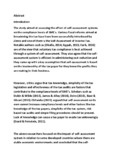Please use this identifier to cite or link to this item:
https://cris.library.msu.ac.zw//handle/11408/4545| Title: | The Impact of Self-assessment System On Compliance Levels of Small And Medium Enterprises Case Study van Sales Company | Authors: | Wadesango Mutema Mhaka |
Keywords: | Self-Assessment Compliance Small Enterprises Medium Enterprises |
Issue Date: | 2018 | Publisher: | Allied Business Academies | Series/Report no.: | Academy of Entrepreneurship Journal , Vol.24 , Iss.3; | Abstract: | Introduction The study aimed at assessing the effect of self-assessment systems on the compliance levels of SME’s. Various fiscal reforms aimed at broadening the tax base have been successfully introduced by Zimra and one of them is the Self-Assessment of Income Tax. Notable authors such as (Okello, 2014; Appah, 2013; Farik, 2016) are of the view that voluntary tax compliance is best achieved through a system of self-assessment. They also agree that the self- assessment system is efficient in administering cost reduction and they came up with a key assumption that self-assessment is based on the trustworthy of the tax payer for they know the profits they are making in their business. However, critics argue that tax knowledge, simplicity of the tax legislation and effectiveness of the tax audits are factors that contribute to the compliance levels of SME’s. Scholars such as Dubin & Wilde (2014), James & Alley (2014), Dziro (2016), Baer & Silvani (2013) Chifamba (2015) argued that self-assessment on its own cannot increase compliance levels and other factors like tax knowledge of the tax payers, simplicity of the tax system, risk based tax audits and simple filing procedures should be present. Lack of knowledge can cause a tax payer to evade tax unknowingly (Erard & Feinstein, 2011). The above researchers focused on the impact of self-assessment system in relation to some developed countries where there are stable economic environments and concluded that the self- assessment system enhanced with other factors brings compliance from SME’s, hence neglecting the fact that in developing countries with a third world economy, other factors will increase the compliance levels of SME’s. The effectiveness of the self-assessment system remains in doubt and questionable. Therefore, this research area remains evergreen in the fields of self-assessment system in compliance levels of small and medium enterprises and gives the researchers the gap to analyze impact of the Self-assessment-system and the compliance levels of SME’s in developing economy. Background Of The Study Self-Assessment of tax is a fairly modern concept whereby the taxpayer, rather than the tax authorities, is responsible for the determination of the tax liability and ensuring that such liability is settled immediately. The Self-Assessment system was introduced in Zimbabwe in September 2010. In his remarks during the SAP Tax Collection Management Summit held in September 2010 in Vic Falls Zimbabwe; Mr. G. T Pasi who is the Commissioner General of the Zimbabwe Revenue Authority said “We recently introduced the electronic filing system for Self Assessed Income Tax returns. It is our sincere hope that e-filing will be extended to other revenue head” Zimra news (2011). “We are working with Zimra on the best way of working with (SMEs). They are afraid of Zimra because once they formalize, the tax man pounces on them, and they say Zimra takes away their money. We are working with Zimra to negotiate with SMEs to be given tax holidays in the process of formalization,” said Minister Sithembiso Nyoni who is the SMEs and Co- Operatives Development Minister (Mapakame, 2016). The minister pleaded with the tax authority to come up with incentives to encourage voluntary compliance because SMEs largely view tax as an additional and unwanted cost to business. Research Methodology The researchers used the descriptive approach to establish what the participants view on the impact of SAS on the compliances levels of SME’s. Under the three forms of descriptive research the researchers used the survey approach which involves interviews and discussions with individuals under the impact of SAS on compliance levels. The population constitutes SME’s surrounding Zimbabwe from which a sample of VanSales was selected. A sample of 8 Finance and senior managers, 5 accountants, 5 accounts clerks and 6 bookkeepers and 13 shop floor workers was used from which information was drawn through interviews and questionnaires. The study sample comprised of 37 respondents. Stratified random sampling was used as it gives information that is more credible from selected respondents. Strata of employees on different functional levels and departments were selected taking into account the educational qualifications. Sekaran & Bougie (2010) assert stratified random sampling encompasses process of classifying on the bases of different factors such as management level and a random sample is then drawn from each stratum. Stratified random sampling was seen to be in line with VanSales. | URI: | https://www.abacademies.org/articles/the-impact-of-selfassessment-system-on-compliance-levels-of-small-and-medium-enterprises-case-study-van-sales-company-7499.html http://hdl.handle.net/11408/4545 |
ISSN: | 1528-2686 |
| Appears in Collections: | Research Papers |
Files in This Item:
| File | Description | Size | Format | |
|---|---|---|---|---|
| wadesango.pdf | Abstract | 194.28 kB | Adobe PDF |  View/Open |
Page view(s)
156
checked on Feb 13, 2026
Download(s)
56
checked on Feb 13, 2026
Google ScholarTM
Check
Items in MSUIR are protected by copyright, with all rights reserved, unless otherwise indicated.



